10 Tricks our brain plays on us in day-to-day life
Have you ever spent your time watching boring movies because you paid for it? OR heard someone saying he knew it already but never said it earlier? OR reasoned out yourself for paying more for something that you saw on a discount sale later?
I’m pretty sure you will say “Yes” to at least 1 of the above questions. Don’t panic, you are not the only one. We all have been through that and much more. We always try to do the right things but in the process our brain tricks us into believing that we are doing the right thing. It is a part of our day-to-day life and our brain does this all the time even without us even noticing most of the time.
Below is a list some of the tricks our brain plays on us in day-to-day life
1. Sunk-Cost Fallacy
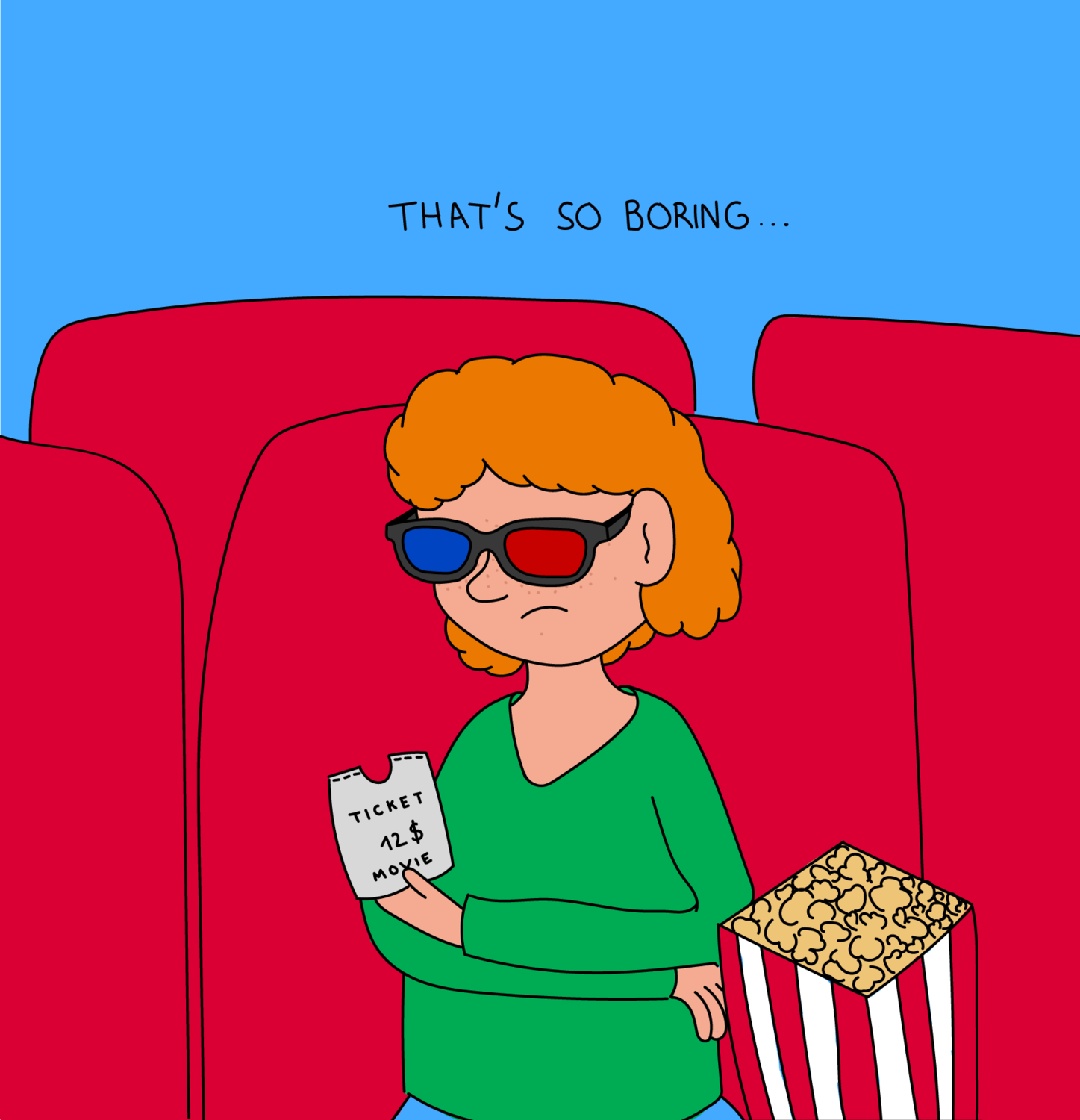
If we have spent money on something which is not good, then we try to minimize the loss by spending extra resources on it without realizing sunk-cost.
For example: We buy a movie ticket to enjoy our time. However after the movie starts we realize the movie is pathetic but we still continue till the end. We make ourselves suffer by sitting throughout the movie because we paid for the tickets. In this case, once we know the movie is not good, we fail to leave the show. We forget that when the money’s gone and cannot be recovered it is sunk-cost. It is better to not spend more time (more resources) on the movie and leave.
2. Cognitive Dissonance
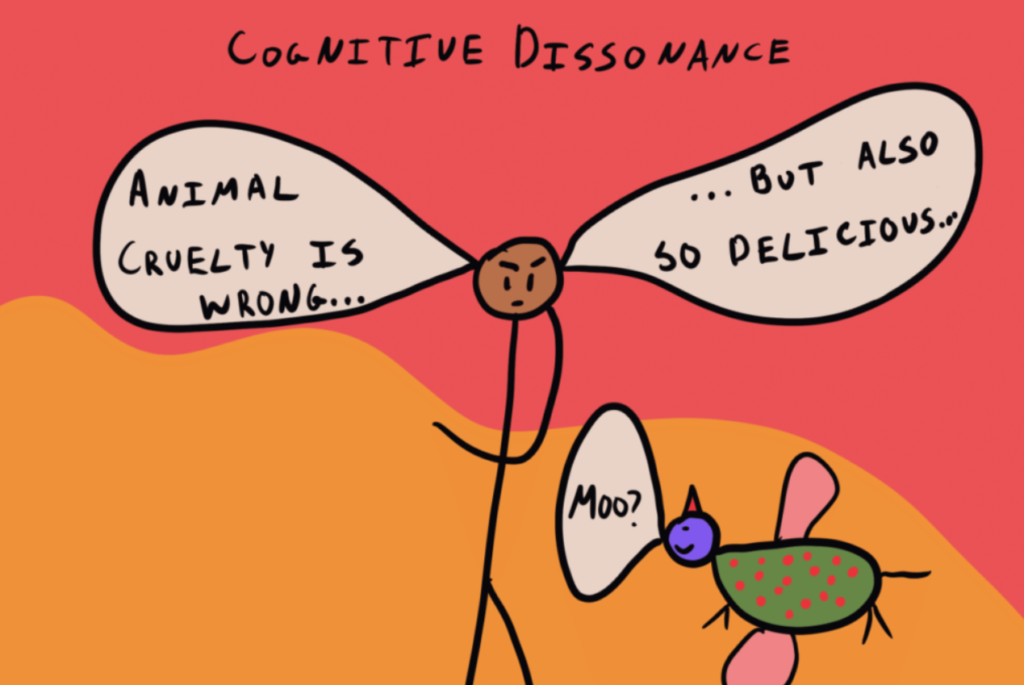
If we are ever stuck in a conflicting situation when our inner-self is not at peace then we make stupid excuses to make ourselves not feel bad about it. This conflicting situation is called cognitive dissonance. Bigger conflict leads to the rise of even stupider excuses.
For example: Think of a case when we are going to the gym regularly to reduce our weight. During this time, someone offers us sweets (chocolate, ladoo, etc.). Then in such a situation we make some reasoning with ourselves to get out of the conflict. We either deny the offer, make a leeway by saying a cheat-day is allowed, make a compromise by saying we will spend more time at the gym to compensate, or take the sweet by ignoring the fact that it has calories. All these actions are methods our brain adapts to get out of conflicts.
Another Example: We buy something during sale, and when we see it on discount sale maybe a week after, we end up feeling bad. In this conflict situation, we try to justify the price we bought at vs the present discount by making up reasons to get out of conflict to feel better.
3. Halo Effect

Our opinions are biased by the positive impressions called Halo Effect. A halo of perceived attributes affects us wherever we go.
For example: Many people who don’t know us judge whether we are good or bad at something solely based on our physical attractiveness.
Another example: When we buy a totally new product then we assume that a product of a known brand would be a better choice without going into details.
4. Confirmation Bias

When we believe something we will find arguments, evidence to favour our belief and ignore contradicting evidence. We try to reinforce our belief and even influence others while doing so.
For example: When we want to buy a phone or laptop and have to ask our parents for money to buy it at that time we put more emphasis and even make up things to make the product sound good even if it is not.. Exact opposite happens when we do not like a particular product.
5. Self Serving Bias
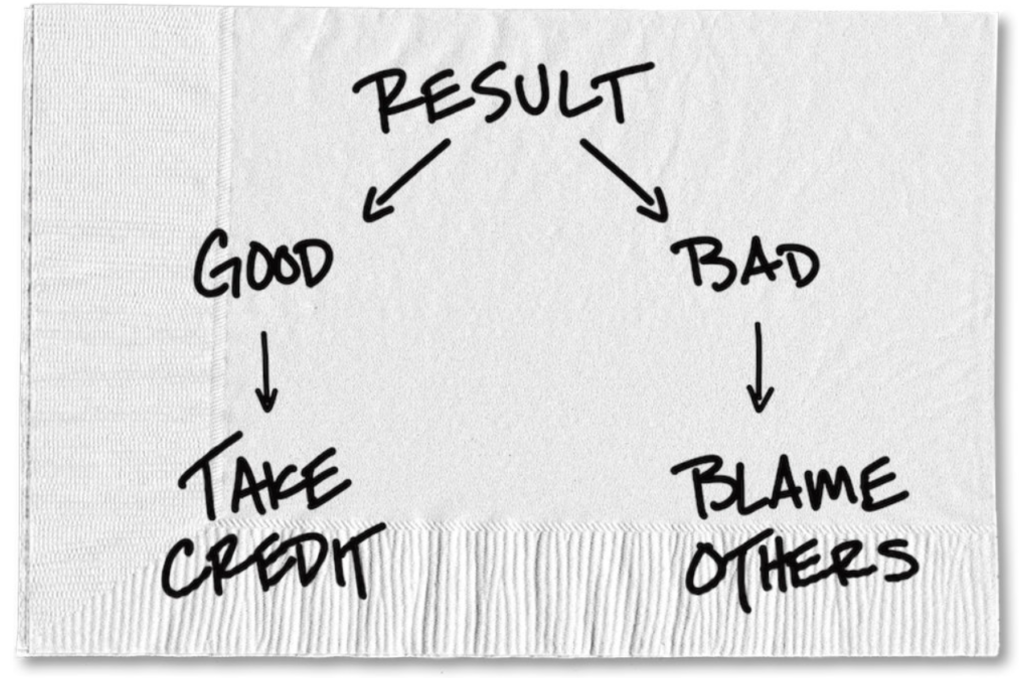
We do not like to take the blame when it is our mistake and blame the mistake done on your situation. When it is someone else we blame it on others and ignore their situation.
For example: When we lose a competition, we blame our situation like bad stomach, bad weather, improper sleep for the loss but if it was someone else then we put all the blame on the person as if it was 100% due to his/her incompetency.
6. Hindsight Bias
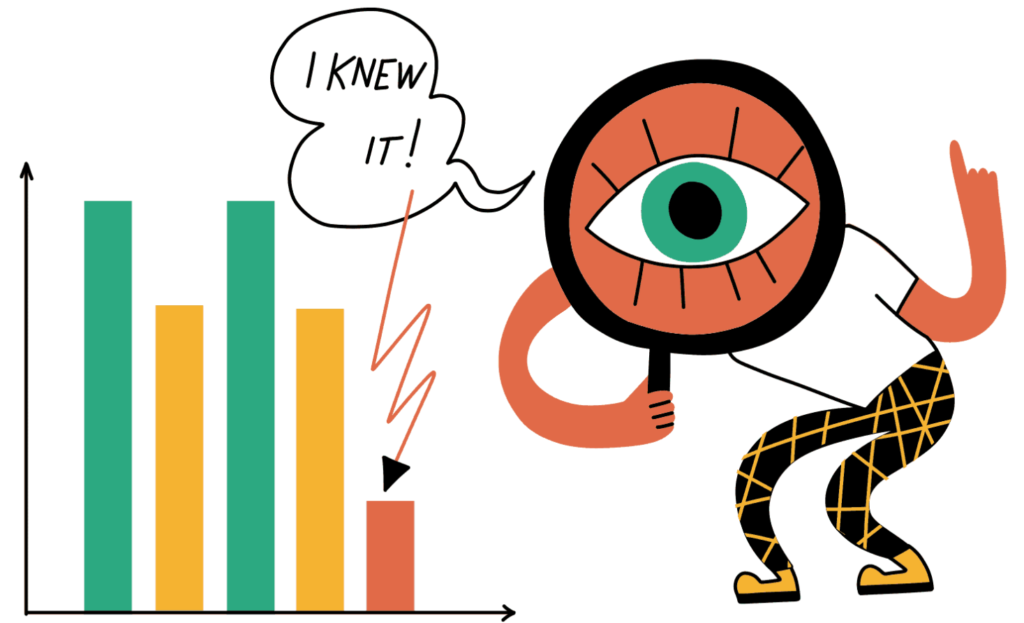
We are all experts when we observe and make decisions in retrospect. Everything becomes obvious until it happens. Everyone of us is an expert after the event has happened.
For example: During a stock market crash, most of the people do not put money in the market. But when the market goes up again, they would say I knew it would go up.
Another example: If there is a sports match and a team wins then there is always someone in the room who would say I knew that team would win. Even though before the match he/she said nothing.
7. Anchoring Bias
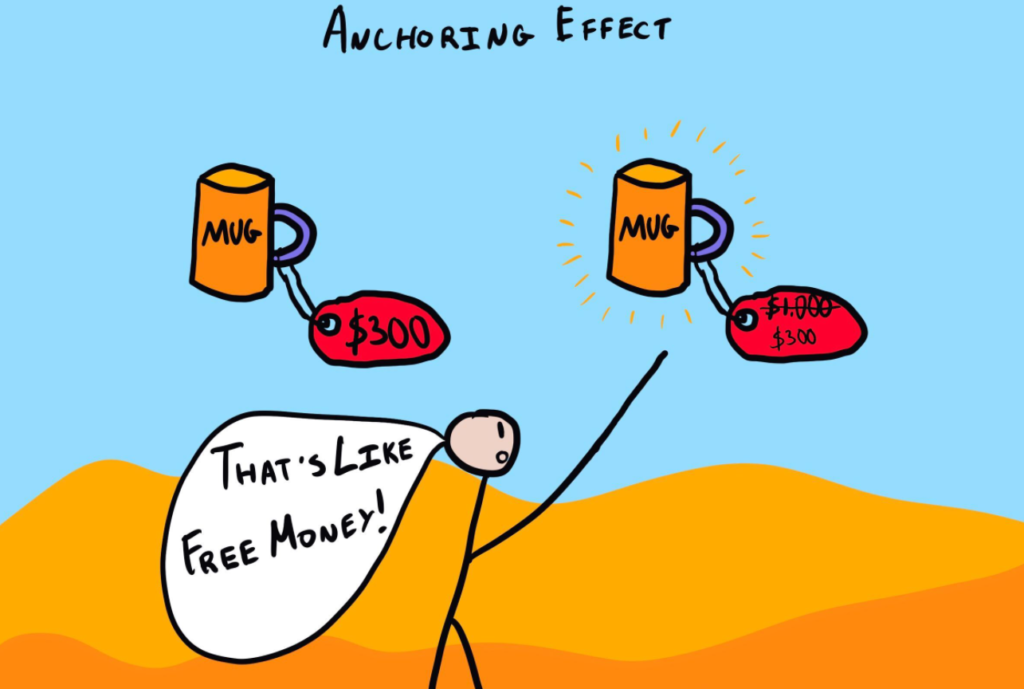
We are anchored to the very first reference point received by our senses.
For example: When we go to buy something and we like it then we focus our energy to get a discount on the asked price even if the asked price was very high. We feel successful in getting the discount. We don’t take a step back to look for the actual price of a similar product in the market.
Another example: This happens during salary negotiations. Many companies ask us to give an expected salary number without telling us about pay-band even before taking an interview. This expected salary number becomes your anchor and even after selection you will be forced to a salary closer to your anchoring figure. Even if they can pay a good salary in the same pay-band they will offer a much lower figure because you anchored yourself.
8. Curse of Knowledge
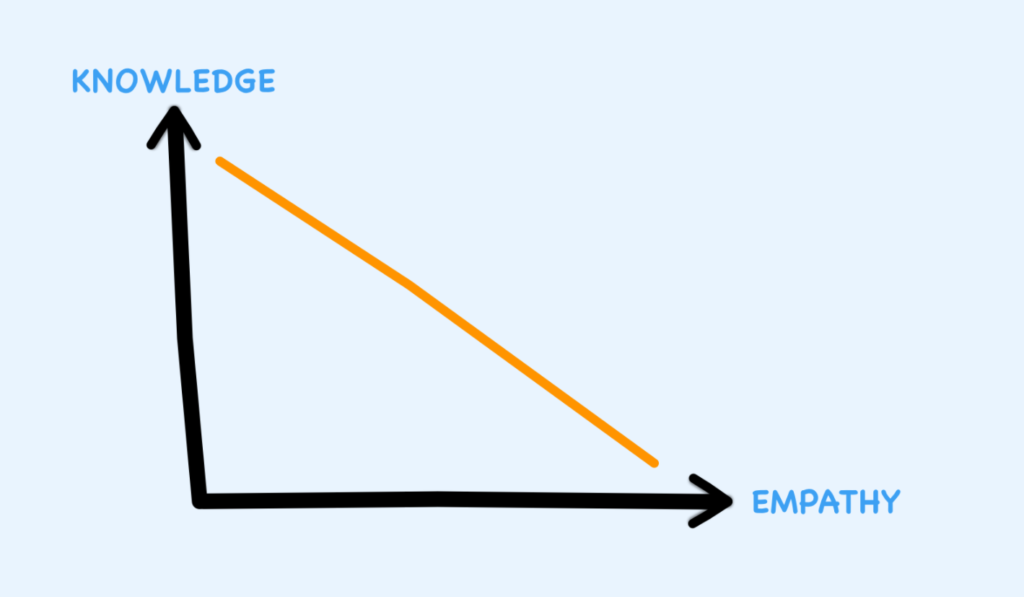
Once you learn something it becomes part of your knowledge and you start expecting others to understand it as well. In our day to day life many times we feel something is common sense and others don’t have it.
For example: Many times our teachers while teaching a subject may skim through very difficult parts of the subject assuming we understood everything. But in reality we understood not even a single thing so as a result we were not even able to ask even a single relevant question at the end of class.
9. Group Thinking
In a group we feel safe and comfortable when we have consent. As a result group we try to minimize conflicts and then end up with very irrational decisions. Acting as a group we feel invulnerable and then do many stupid things as a group that we would never do alone.
For example: When we work in an office, we let the group decide whatever they want only to get the activity done as soon as possible without ever voicing our opinion that we do not want to do it or we do not have to do it at all.
Another example: During protests, we see in news various acts of vandalism only because no one in the group voiced against the wrong-doings.
10. Spotlight Effect
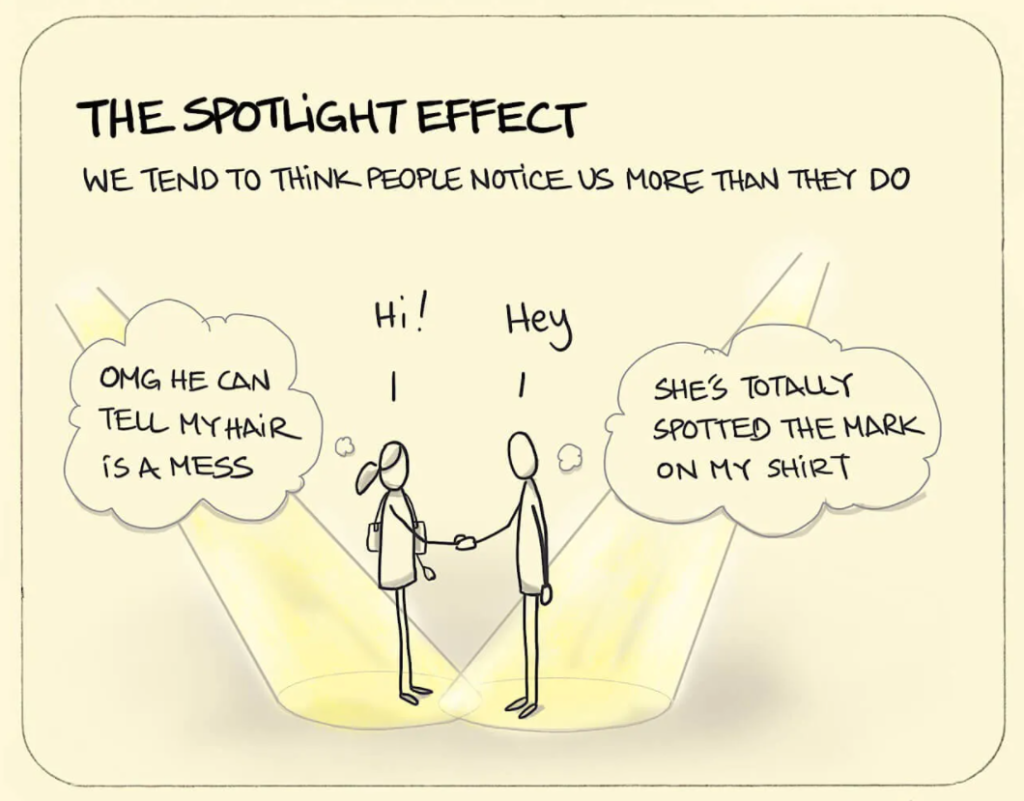
We feel that people around us are watching us, noticing us. We feel we are under the constant spotlight as if we are the center of everyone’s world. But in reality everyone is usually concerned about themselves and not others. We are the center of our own world and not others.
For example: When we do something in a public place, we are overly cautious. We overthink about what people may say, talk about us later. Due to this we end up feeling embarrassed when we slip on the wet-floor or stutter during a speech, while others are not even paying attention.
Conclusion
This list of tricks played by our brain is not exhaustive. There are many more tricks our brain plays on us. We can observe these tricks happening all around us and to us in our day-to-day life. By the way, these tricks don’t operate in isolation. Hope you were able to relate with the examples I mentioned in the list.
Feel free to share your thoughts in the comment section below. Thanks for reading. Hope it helps.




